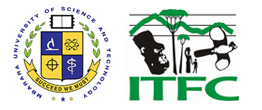The major cause of human-wildlife conflict (HWC) worldwide is the competition between the ever-increasing human populations and wildlife competing for the same declining living spaces and resources. In Bwindi Impenetrable National Park (BINP) one the most critical aspects of HWC is the human-gorilla conflict. The increase of gorilla tourism increased the habituation of wild gorillas and this has consequently increased the movement of habituated gorillas into local community fields. In the quest to reduce this conflict, “HUGO” was initiated and born in the late 1990s. HUGO is, a team of local volunteers (about 10 chosen from communities) with a ranger that help in a coordinated way to chase away gorillas from local community gardens back into the park.
In order to understand the attitude, motivations and impacts of the HUGO team members in mitigating HWC around BINP, one hundred (100) semi-structured household interviews were carried out around BINP and this involved randomly selecting households of HUGO (n=50) and non-HUGO (n=50) members from the study parishes of Nteko (n=30), Mukono (n=30), Rubuguri (n=20) and Bujengwe (n=20).
Ninety-six percent of respondents (n=100) experienced crop raids by gorillas. Fifty percent of HUGO respondents said their joined HUGO voluntary, 25% joined because they thought it would give them status and 20% joined because they thought it put them in a better position to protect their crops from gorillas. The number of people joining HUGO since its inception in 1998 has been gradually reducing for all the parishes in the study area. Most people who joined HUGO had higher expectations than what they encountered in reality. The communities too expected a lot more from HUGO because they believed the HUGO members were facilitated in their activities to reduce gorilla crop raids. During the FGDs we also established that the HUGO members abandoning the program were not being replaced. This result is perhaps an indication of the reduced motivation and morale to joining the HUGO program by local people. Nevertheless during our interaction with Non HUGO members they showed a willingness to join the program if the working conditions and incentives of HUGO could be improved
Twenty four percent of the HUGO respondents attributed the monthly food rations given to them by UWA as the most important incentive for joining HUGO while 21% associated the livestock projects funded by IGCP as the most important incentive to joining HUGO. Other associated benefits mentioned by the HUGO members included; equipment (rain gear, uniform, torches, etc.) got from UWA and IGCP and the support to their saving and financial schemes (VSLA). During incidences of crop raiding incidences only 14% respondents mentioned that they reached a gorilla crop raiding sites within 15 minutes. Majority of respondents (34%) mentioned that they reached the gorilla crop raiding sites between 30 minutes to 1 hour. Both HUGO and Non HUGO members however look at the current incentives for HUGO as being insufficient. Choosing the appropriate incentive requires a conditionality and balance so that any incentive chosen does not attract any member of community but rather draws interest of the very people at the frontline of the conflict, those with vested interest in reducing crop raiding in their gardens
Eighty eight percent of HUGO respondents mentioned that the HUGO program was an effective intervention while 78% of non-HUGO respondents mentioned that the HUGO program was an effective intervention. This is in agreement with several other studies carried out before (e.g. Byamukama and Asuma 2006; Babaasa et al. 2013 and Akampurira et al., 2015). This therefore shows that HUGO remains one of the most effective interventions against crop raids by gorillas and other large animals such as elephants. It is therefore important that all stakeholders working in and around BINP on conservation and livelihood projects work together towards supporting this program. As much as there are other conservation challenges, human-wildlife conflict is one of the biggest challenges BINP and other national parks in Uganda face. Reducing this conflict opens up opportunities for engaging communities on other conservation and livelihood challenges. We recommend that UWA as the major stakeholder and custodian of wildlife take the lead to engage other stakeholders to support the HUGO program.
IGCP initiated a training program for all HUGO members and UWA staff on the use of automated devices for HUGO data collection in June 2018. During the training, we noted that only very few HUGO members were adept and quick at learning the working procedures of the automated devices. This perhaps is a result of the education levels of most HUGO members. This study shows that majority of HUGO respondents (79%) had only attained primary level education and most stopped in primary 5. We noted that during the training, most HUGO members being trained had no clue of how the automated tool works and what were expected from them even after the training ended. For example the HUGO members over 60 years had a difficulty in reading texts on the devices. This however does not mean that HUGO cannot use the technology rather it emphasizes the need of regular refresher trainings and recruitment of HUGO members based on a criteria that matches the skills needed by the HUGO program. We recommend that the process of data collection on the mobile devices be made shorter and simpler. It would be better if the use of texts in the automated device was eliminated all together and replaced with the use of pictures/photos and symbols/icons that are more known and make sense to the illiterate HUGO members.
Report File
- Document
